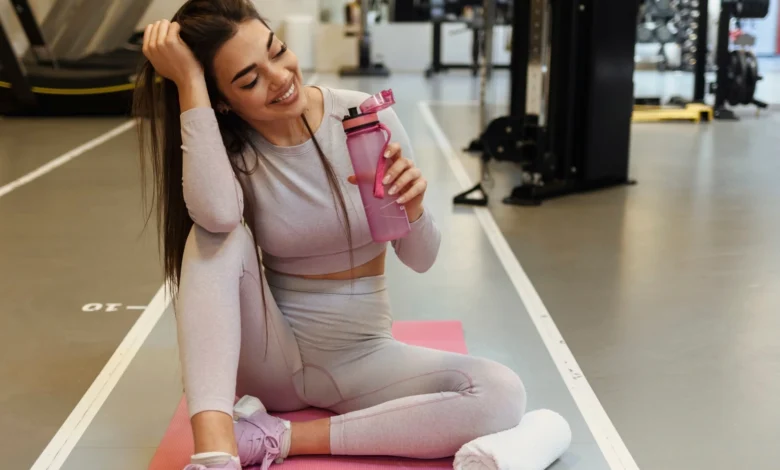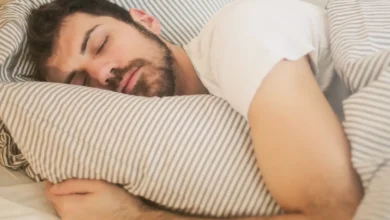How to Sleep Better After a Workout?
Struggling to sleep better after a workout?
At Healthy Stride Wellness, we know how essential recovery is for your overall health and fitness, and sleep is a key part of that process. Many people find it difficult to relax and sleep, especially after evening workouts.
In this blog, we’ll explain why sleep can be challenging post-exercise and share effective routines to help you rest better.
Keep reading to discover practical tips that will help you sleep better after a workout and enhance your recovery.
Table of Contents
Key Takeaways
- Exercise Enhances Sleep: Regular physical activity helps regulate sleep hormones like melatonin and reduces stress, promoting better sleep recovery.
- Timing Matters: Finish workouts at least 1-2 hours before bed to allow your body to cool down and improve sleep quality after exercising.
- Relaxation Techniques Aid Sleep: Incorporating stretching, breathing exercises, and mindfulness post-workout can help you unwind and sleep better after a workout.
Why It’s Difficult to Sleep After a Late Workout
Exercising is great for your body and mind, but it can also make it harder to sleep, especially when you work out in the evening.
This is because physical activity stimulates your central nervous system, raises your body temperature, and boosts your heart rate, making it difficult to settle down and fall asleep.
Why Can’t I Sleep After an Evening Workout
Many people experience trouble sleeping after working out late in the day due to the post-exercise energy boost.
Your body is still pumped up from the physical activity, and it takes time for your heart rate, adrenaline levels, and body temperature to decrease to a point where sleep feels natural.
How to Sleep Better After Exercising in the Evening
If you often work out at night, it’s important to create a routine that helps your body transition from exercise to sleep mode.
Here’s how you can improve your sleep after exercising in the evening:
Does Exercising at Night Affect Sleep Quality
Yes, exercising at night can affect sleep quality, but the key is timing. Try to finish your workout at least 1-2 hours before bedtime to give your body time to cool down and relax.
This buffer period can help regulate your heart rate and body temperature, which are important for sleep.
How to Sleep Better After Exercising in the Evening
- Cool down properly: Incorporate a longer cool-down phase after your workout to lower your heart rate and reduce body temperature. Gentle stretching or light yoga can be highly effective.
- Create a bedtime routine: Engage in activities that help calm your mind, such as reading, meditation, or listening to soft music. Setting up a nightly routine can signal your body that it’s bedtime.
- Stay hydrated: Drink water throughout the day and after your workout, but avoid drinking too much right before bed to prevent waking up during the night.
By following these strategies, you’ll be able to adjust your routine and sleep better after a workout without disrupting your overall sleep quality.
How Exercise Improves Sleep
Exercise significantly improves sleep by enhancing sleep quality, reducing stress, stabilizing mood, and increasing slow-wave sleep, all of which contribute to better rest.
Regular physical activity helps reduce cortisol levels, allowing for deeper relaxation, while also boosting mood-regulating hormones like serotonin and dopamine, making it easier to transition into sleep.
Exercise can also alleviate symptoms of sleep disorders like insomnia and sleep apnea, promoting more consistent rest.
To maximize these benefits, a proper post-workout cooldown and a sleep-friendly environment are essential, helping you sleep better after a workout and wake up feeling fully rejuvenated.
Best Relaxation Techniques After a Workout
Winding down after exercise is essential for promoting good sleep. Incorporating relaxation techniques can help reduce adrenaline and cortisol levels, making it easier for your body to transition to rest.
- Stretching: A short stretching routine post-exercise helps release tension in your muscles and promotes relaxation. Focus on gentle stretches that target major muscle groups.
- Breathing exercises: Slow, deep breathing helps calm your nervous system and lower your heart rate, preparing your body for rest. Try box breathing (inhale for 4 seconds, hold for 4 seconds, exhale for 4 seconds, and hold for 4 seconds) to encourage relaxation.
- Natural ways to calm down after a workout for better sleep: Consider practicing meditation or mindfulness exercises to relax both your body and mind. These techniques help reduce stress hormones and increase your chances of falling asleep quickly.
For example, according to the American Heart Association, individuals who practiced mindfulness meditation for 10 minutes after exercise reported a significant decrease in stress and felt better prepared for restful sleep. Discover more ways mindfulness can support recovery at the American Heart Association.
Incorporating these practices will help you sleep better after a workout, especially if you struggle with winding down.
How Long Should You Wait to Sleep After Exercising?
Timing is crucial when it comes to sleeping better after a workout. The ideal time between finishing your workout and going to bed depends on the intensity of your exercise, but here are some general guidelines:
- For moderate exercise like walking or light cycling, you can typically go to bed within 30 minutes to an hour after cooling down.
- For more intense workouts, such as high-intensity interval training (HIIT) or weightlifting, it’s recommended to wait at least 1-2 hours before attempting to sleep. This allows your body to return to its resting state.
How to Cool Down for Better Sleep After Exercise
- Stretching and light activity: Cooling down with light stretching or yoga helps reduce muscle tension and lowers your heart rate.
- Shower: A warm shower can help lower your body temperature gradually, making it easier to fall asleep.
- Hydrate and refuel: Rehydrate and eat a small snack with protein and carbohydrates to replenish your body after an intense workout, but avoid heavy meals close to bedtime.
By managing the timing of your workout and cooldown, you can ensure that you’re able to sleep better after a workout and wake up feeling refreshed.
Tips to Unwind and Sleep Better After Working Out
It’s essential to incorporate calming activities into your routine to help your body wind down. Here are some simple yet effective tips to promote relaxation and improve your sleep after a workout:
- Limit screen time: Avoid screens (phones, computers, or TV) for at least 30 minutes before bed, as blue light interferes with melatonin production.
- Keep your bedroom cool: A cooler environment helps signal to your body that it’s time to sleep. Aim for a room temperature between 60-67°F (15-19°C).
- Dim the lights: Dimming the lights in your home can help promote melatonin production and prepare your body for rest.
By following these tips, you’ll create an environment that supports recovery and helps you sleep better after a workout.
Ways to Improve Sleep After a Workout
Maintaining a consistent routine is one of the most effective ways to improve your sleep. Here are some key strategies to enhance your sleep recovery after physical activity:
- Set a consistent bedtime: Going to bed at the same time each night helps regulate your circadian rhythm and improves sleep quality.
- Stay hydrated: Drinking water throughout the day can help prevent dehydration, which can interfere with sleep.
- Avoid caffeine post-workout: Caffeine can stay in your system for several hours and interfere with your ability to fall asleep.
By integrating these practices, you’ll be able to enhance your recovery and sleep better after a workout.
Effective Techniques for Sleep Recovery After Exercise
Recovery is not just about what you do during your workout; it’s also about how you manage your sleep after exercising. Here are some effective techniques to promote recovery and rest:
- Hydration: Rehydrating after exercise helps support your body’s recovery process, reducing muscle soreness and promoting restful sleep.
- Stretching and mobility: Gentle stretching before bed helps improve circulation, relaxes your muscles, and makes it easier to sleep.
- Mindfulness and relaxation: Practicing mindfulness or meditation can lower cortisol levels, helping you sleep more deeply and recover faster.
Incorporating these techniques will not only help you sleep better after a workout but also promote long-term recovery and well-being.
How to Optimize Sleep After Evening Exercise
Even if you prefer working out in the evening, it’s still possible to get quality sleep. Here’s how to optimize your sleep after evening exercise:
- Finish your workout early: Aim to complete your workout at least two hours before bedtime to give your body time to relax.
- Relaxation routine: Engage in calming activities such as stretching, deep breathing, or reading to help your body transition to sleep.
- Limit stimulants: It’s best to steer clear of caffeine or any other stimulants near your bedtime.
Following these tips will help you manage your recovery and sleep better after a workout, even if you prefer exercising in the evening.
How to Cool Down for Better Sleep After Exercise
Cooling down after a workout is an essential step in promoting better sleep. A proper cooldown helps gradually lower your heart rate, reduce body temperature, and prevent muscle stiffness—all of which contribute to improved sleep quality.
To cool down effectively, consider incorporating light stretching, deep breathing exercises, and gentle yoga post-workout.
These activities help to transition your body from an active state to a relaxed one, making it easier to unwind and prepare for rest.
Cooling down also signals to your nervous system that it’s time to recover, reducing stress levels and promoting better overall sleep.
Natural Ways to Calm Down After a Workout for Better Sleep
If you find it difficult to relax after a workout, try integrating natural ways to calm down that will enhance both your recovery and sleep.
Techniques like progressive muscle relaxation, deep breathing, and guided meditation can help activate your parasympathetic nervous system, which is responsible for rest and recovery.
Aromatherapy using essential oils like lavender and chamomile is another effective way to ease tension and prepare your body for sleep.
Drinking a warm herbal tea, such as chamomile or valerian root, can further promote relaxation by calming your mind and reducing stress levels, helping you sleep better after a workout.
Learn How to Sleep Better After Physical Activity
If you’re looking to improve sleep after physical activity, the key is to balance your workout routine with effective recovery strategies.
Learning how to sleep better after physical activity involves understanding your body’s natural recovery processes and creating a post-exercise routine that promotes relaxation.
Start by focusing on hydration and refueling your body with light, healthy snacks to aid recovery. Then, incorporate calming activities such as gentle stretching, breathing exercises, or reading before bed to create a peaceful transition into sleep.
A study by the National Sleep Foundation found that athletes who combined light post-workout snacks with gentle stretching reported falling asleep 20% faster and experiencing improved sleep quality. For more on sleep-supportive post-exercise routines, visit the National Sleep Foundation.
Understanding your body’s needs after a workout can help you fall asleep faster and enjoy more restorative rest.
Solutions to Relax and Sleep Better After Exercising
Post-exercise relaxation is crucial for promoting restful sleep. Here are some effective solutions to relax and sleep better after exercising:
- Progressive Muscle Relaxation: This involves tensing and then relaxing different muscle groups, which helps release built-up tension from your workout and prepares your body for rest.
- Breathing Techniques: Practice deep, rhythmic breathing (e.g., the 4-7-8 technique) to lower your heart rate and calm your mind.
- A Warm Shower or Bath: Taking a warm shower or bath after exercising helps lower your body temperature gradually, signaling to your brain that it’s time to sleep.
- Mindfulness or Meditation: Engaging in mindfulness or meditation exercises post-workout can ease mental stress, reduce cortisol levels, and promote a relaxed state of mind before bed.
By implementing these solutions, you’ll be able to sleep better after a workout, ensuring your body fully recovers and rejuvenates during the night.
To Sum Up
Incorporating the right strategies after working out can make a significant difference in how well you sleep.
By following the tips and techniques outlined in this blog, you can create a post-exercise routine that promotes relaxation, supports your body’s recovery, and helps you sleep better after a workout.
Boost your sleep recovery with expert tips from Healthy Stride Wellness.
Discover how to sleep better after a workout and wake up feeling refreshed every day!
FAQs
Why do I sleep better after exercise?
Exercise helps regulate hormones like melatonin and reduces stress, making it easier to fall asleep and enjoy deeper, more restorative rest.
Is sleep good after a workout?
Yes, sleep after a workout promotes muscle recovery, reduces fatigue, and supports overall health and well-being.
Do you sleep more after working out?
You might sleep more after working out as your body requires more rest to repair and recover from physical exertion.
Is it good to feel sleepy after a workout?
Yes, feeling sleepy after a workout is a sign that your body is ready for recovery and rest, which is essential for overall fitness.
Please Note: Healthy Stride Wellness provides educational content and is not a replacement for medical advice. Consult a healthcare provider for any health issues.





